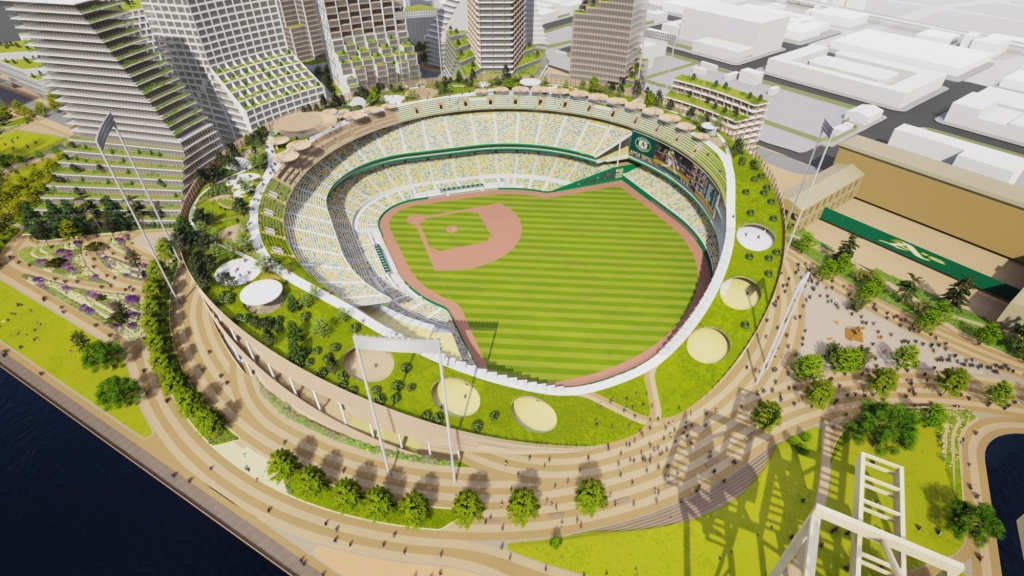OAKLAND — The Oakland A’s proposed plan to build a massive ballpark and mixed-use housing development at the Port of Oakland’s Howard Terminal is facing a lawsuit over the city’s approval of its environmental impact report.
The group that sued is a coalition of shipping companies, truckers and workers who have stood adamantly opposed to the proposed development at the port. They say the development’s impact on logistics at the port will be too burdensome, leading to challenges for the companies that transport goods in and out of the port and their workers alike.
The lawsuit – which is filed in Alameda County Superior Court by the East Oakland Stadium Alliance, Schnitzer Steel, Pacific Merchant Shipping Association, the Harbor Trucking Association, California Trucking Association and the International Longshore and Warehouse Union – argues that the City Council approved a flawed environmental impact report for the project.
The council certified the report about a month ago, declaring then that the proposed project meets the requirements under state law for evaluating the environmental impacts and mitigation measures.
The lawsuit contends that the report the city council approved did not properly disclose or mitigate all the potential impacts of the project.
“The A’s proposal to build a stadium and luxury condominiums, office and retail development will cause major disruptions and impacts to both the surrounding community and the operations of the Port, yet the EIR did not fully address these concerns or mitigate these well-known issues,” said Mike Jacob, the vice president of the Pacific Merchant Shipping Association who has been leading the coalition against the Howard Terminal project, in an emailed statement.
“It also failed to accurately compare the Oakland Coliseum site as an alternative which would have far less adverse effects,” Jacob continued. “It is simply not proper to ignore or defer analysis or mitigation of so many of the significant impacts identified in the more than 400 comments submitted by community and supply chain stakeholders, and as a result, our only alternative is to pursue legal recourse.”
Monday marks the last day of the window in which legal challenges over the environmental lawsuit must be filed.
A’s President Dave Kaval said Friday in an interview that the lawsuit presents yet another “hurdle” for the team to grapple with in developing this project. He pointed to the different regulatory environment in California for big real estate projects over Nevada, which is where the team is threatening to head if the Howard Terminal project falls through.
Building a new stadium at the Coliseum, Kaval has insisted over the last year, is not in the plans for the team. It’s “Howard Terminal or bust,” he has said.
The lawsuit – or any others filed over the environmental review – is not likely to slow the project down for years. The state Legislature passed a law – AB 734 – several years ago that requires that any environmental or other complaints about the waterfront site be resolved within 270 days after the project’s final approval.
The A’s and some city leaders are hoping to have the Howard Terminal development agreement approved this summer.
But there are other roadblocks.
Recently, an advisory committee recommended that the 55-acre Howard Terminal property be used only for Port of Oakland activities, not as the site of the A’s planned 35,000-seat ballpark surrounded by a planned village of 3,000 housing units, offices, retail, hotel rooms and public parks.
It’ll be up to the San Francisco Bay Conservation and Development Commission to accept or reject that recommendation, which is slated to happen in June.










